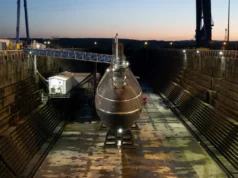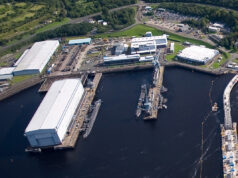Defence technology company Helsing will open its first UK Resilience Factory in Plymouth, creating high-value jobs and establishing the city as a national centre for marine autonomy, the government has announced.
The announcement came alongside the publication of recommendations from the Defence and Economic Growth Taskforce, a joint initiative between government and industry aimed at unlocking the economic potential of Britain’s defence sector. The report sets out a “Team UK” strategy to boost innovation, private investment, and job creation, especially in high-value defence technologies.
Helsing’s Plymouth facility will manufacture SG-1 Fathom autonomous underwater gliders, part of a £350 million private investment first outlined in the 2024 Trinity House agreement. These AI-powered systems are designed for persistent maritime surveillance and to help protect critical subsea infrastructure.
Described as a “Resilience Factory,” the site will not only serve as an advanced manufacturing centre but also function as a national hub for sovereign technology development in underwater defence. While the term is not a formal industrial category, in this context it refers to a facility that enhances national resilience by strengthening domestic capability in strategically important technologies. That includes reducing dependency on foreign suppliers and anchoring design, production, and support expertise within the UK.
Chancellor Rachel Reeves said the project reflects the government’s broader ambition to link defence policy to national economic growth. “Through this, and the work of the Defence and Economic Growth Taskforce – including Helsing’s welcome announcement of the first UK Resilience Factory – we are securing our nation and unleashing the economic potential in the Defence sector, benefitting working people across the UK through our Plan for Change,” she said.
Ned Baker, Helsing’s UK Managing Director, said the company is accelerating its investment in response to the government’s policy direction. “We are investing in both by opening the first UK Resilience Factory and accelerating our £350m commitment,” he said. “Together, we can attract further private investment, equipping our Armed Forces and growing the economy.”
The factory will also support the government’s aim to develop regional defence industry clusters. The Defence and Economic Growth Taskforce has recommended a series of Defence Growth Deals to promote investment outside traditional defence hubs.
Defence Secretary John Healey described the initiative as part of a shift in how the UK approaches defence industry policy. “We are building a new partnership with the UK’s outstanding defence industry, with innovators and with investors,” he said. “We will equip our Armed Forces for the future and make defence an engine for economic growth.”
The Taskforce, co-chaired by the Chancellor and Defence Secretary and supported by the Confederation of British Industry and consultancy Oliver Wyman, has also recommended procurement reforms, export support, and increased backing for dual-use technologies as part of a broader Defence Industrial Strategy to be launched later this year.













There’s that word again….change.
Are the UK actually buying any of these gliders?
After a review, subject to, when the economy isn’t going down the tubes…..
Funny how after 14 years of absolutely awful government that things don’t turn around in 12 months isn’t it?
I dunno but who would have thought it eh?
guilty conscience, my friend? I never mentioned politics. As most will know on ukdj I was just as critical of the Tories.
Hardly, a) I’m not a member of the government and b) I support and vote for another party altogether
Hi mate, I know it can be easy to be suspicious of the government – for good reason.
But I remember you and I lamenting the loss of UK defence industry in key areas over the last few years in the comments section more than once. At least there are good signs of a turnaround on that subject at least, with this, Sheffield forgemasters, the M777 factory, and others.
Absolutely, actually ordering some of this kit would be nice, don’t get me wrong! But I see some space for optimism here. We’ve been letting advanced engineering and manufacturing whither too long.
Hi mate.
Long time, mate. There is so much talk at the moment but until orders arrive in the autumn I’ll remain very sceptical.
There is investment in industry, sure, but that’s what HMG like. I want investment in conventional forces and numbers increased.
Hi M8, My scepticism goes way beyond our Government, its industry as well. Helsing SE is a 2021 German start up technology funded by Spotify’s owner, their latest published turnover was €37.6 million and as far as I can see their only contract so far is building drones for Ukraine.
If you think HMG makes overstated, grand sounding impressive statements I just Love the press blurb about the drones, it made me laugh ! “Helsing, The leading European Defence Technology Company”..Wow l
I do like their idea of Small Resilience Factories it’s very interesting, set up small hi tech factories in dispersed customers countries so they can assemble in country. But first they need a customer.
The idea of national resilience being linked to having construction factories in the UK is very limited really. The supply chains for any complex equipment are global nowadays. It wouldn’t surprise me at all if some of the raw minerals used to manufacture high end electronic components for our most advanced weapons once came out of the ground in places like Siberia etc.
Sure, final construction here is worthwhile economically and might ensure we have a view shiny things that can be completed in a rush if needed, but it doesn’t mean a thing in the long run unless we have secure global supply chains in place. Lose those, the factory has nothing to put together and we are no better off than if the factory was in the USA or anywhere else in the world.
Global supply chains are all well and good in times of peace but when things start kicking of as they have suddenly you can’t actually guarantee that your widgets made on the other side of the world can get here at all and if your defence relies on said widgets that’s game over.
worse though is that wherever the widget is made, if it relies on rare earth elements (as almost anything electronic does nowadays), there’s only so many places they can be mined out of the ground and there is simply no way round that problem. Like it or not we are now a global economy.
Rare earths despite the name are not actually all that rare. It’s just that mining them is an ecological disaster so people let China poison themselves. As they have been using withholding them to pressure other countries though that will likely change.
Whilst it is true that they aren’t rare, the rest of your post isn’t correct as they occur in concentrated deposits and are distributed near the surface very unevenly.
Better give Canada a ring then as they have a lot of alternative sources of vital minerals and their recent deal with Greenland opens up yet more. Hmmm wonder if that’s why Trumpington has his eyes on both.
We’ve been reliant on imports since we had an empire- our economy adapted to it. I don’t think we’ll ever be completely self sufficient.
We also need to bear in mind that living costs in the UK are expensive- we can’t afford to be doing low-tech manufacturing. We need this higher tech design and advanced fabrication stuff here, because that has enough value in it to pay a decent wage.
I’m all for having strategic capability for steel manufacturing etc. that we may need to pay over the odds for, but we can’t do that for everything. This is a good start, in my view.
Excellent. Got the underwater vampires sorted then.
It’s only resilient if Plymouth has an adequate defence against aerial attack. Does it? Given the number of royal navy vessels there it ought to have but after three years of Ukraine neither of the governments in power seem to have grasped the nettle and ordered sufficient air defences.
Got a lovely powerful radar setup overlooking Portsmouth. Only needs a silo of missiles and it could umbrella the whole town and base.
AA
What they have up there is a complete T45 system (training), it could actually cover from Portsmouth all of the South Coast including Plymouth and England up to the Midland (inc London). Oh if only someone would join up the bloody dots and put some missiles up there (and even some remotely elsewhere).